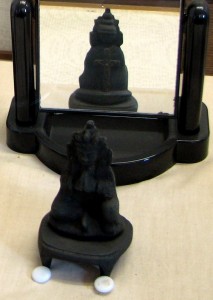I have now produced two more short introductory videos: ‘The Middle Way and Buddhism’ and ‘The Middle Way and Christianity’. This has also led me to think about the rather different approaches I took to each religion, and to want to write up here some explanation of that difference. Before I explore the differences, though, it’s probably better if you see the videos. I will embed them here. (Also please note that if you are reading this without any prior exploration of Middle Way Philosophy, it would also be better to view the general introduction first before these).
One thing you will readily notice about the two videos is that in relation to Buddhism I emphasise the distinction between the Middle Way and Buddhism, whilst in Christianity I emphasise the relationship between the Middle Way and Christianity. This is only intended to challenge what I perceive to be the overwhelmingly common assumptions in each case: that Buddhism somehow owns the Middle Way (even that the Middle Way Philosophy is ‘really Buddhism’) on the one hand, and that Christianity has nothing to do with the Middle Way on the other. Of course, it would be equally possible to emphasise the relationship between Buddhism and the Middle Way, or the ways that the dominant interpretation of Christianity is antipathetic to the Middle Way: but treatments of both are common enough.
Of course, the cases made for both are equally dependent on a wider argument I want to make about tradition. Traditions do not have essences (or if they do, we have no way of determining them), any more than people do. (For more about tradition please see this video.) If we expect to be able to take the positive, integrable aspects of ourselves and choose to dwell on those and develop them rather than the negative, absolutizing parts of ourselves, we should extend the same courtesy both to others and to other traditions, rather than defining them absolutely in terms of things we reject. Some individuals can be psychopathic, utterly repressing all sympathy for anything other than their dominant egoistic goals, and larger groups or traditions can also sometimes exhibit such psychopathic features (think of Daesh). But we should be extremely cautious about attaching any such labels to an extremely diverse, millennia-long tradition. These traditions are part of people’s identities and need to be acknowledged and worked with, though of course they will contain both helpful and unhelpful elements.
I think it is equally important, whatever tradition one may be working with, to acknowledge the Middle Way as something separate, that stands apart from tradition, and indeed as something more important than tradition. That is not a rejection of tradition, but it is a way of avoiding being confined by it. Any Buddhists or Christians who can take this attitude are very welcome in the Middle Way Society, and one of the society’s founding values is that universality.
On the other hand, approaching both Buddhism and Christianity in terms of the Middle Way is not a vague universalism either. The aim is to be quite precise about what the Middle Way is (even though our understanding of it is of course always developing) and to use the Middle Way as a tool for resolving conflicts between traditions. Religions are not essentially all one: what is or can be one is the recognisable features of good judgement in relation to them. By agreeing about how we will judge our different traditions and situations, we can at the same time acknowledge a great diversity of specific religious symbol and practice, and yet co-operate in the wider process of understanding and practising the Middle Way. Then diversity becomes a strength, not a weakness, providing a variety of possible models for different situations. It also becomes a key way of resolving conflict. If we were to all admit that we do not have final access to God or any other absolute, and train ourselves in relying on experience, what grounds of conflict would remain? It is absolutes that collide in conflict, not experiences.
For anyone interested in more detail about the relationship between Buddhism and Christianity, here is a paper I wrote in 2008 called Should Western Buddhists be Christians? Western Buddhists were the target audience for this paper, though it might also possibly be of interest to Christians.
At present I am not intending to produce further videos for other religions. Buddhism and Christianity are both religions that I have direct experience of, but in other cases (such as Islam) my knowledge is largely academic, and it would be much better to leave it to others with more direct experience to explore their meaning in relation to the Middle Way. You can already find such material on this site about the Jewish Middle Way, written by Susan Averbach.
Picture: Buddha with hidden cross on the back: Chris 73/ Wikimedia CCSA 4.0
